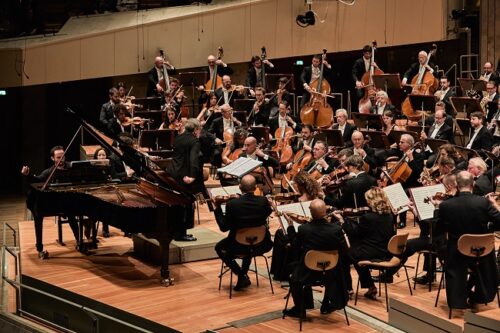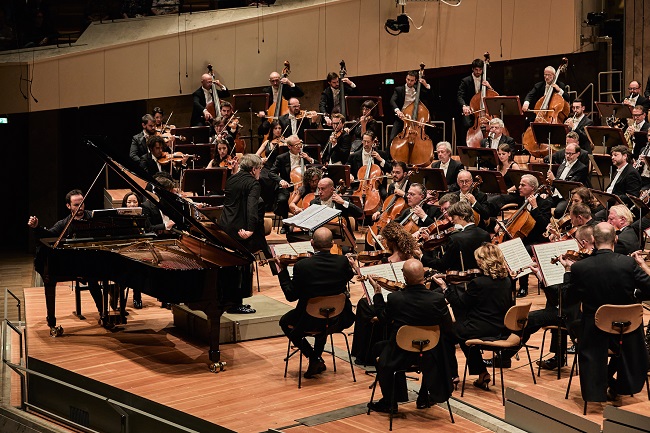 Germany Musikfest Berlin 2022 [6] – Schoenberg, Busoni: Igor Levit (pianist), Orchestre e Coro dell Accademia Nazionale di Santa Cecilia / Sir Antonio Pappano (conductor). Philharmonie Hall, Berlin, 5.9.2022, and livestreamed on the Digital Concert Hall. (GT)
Germany Musikfest Berlin 2022 [6] – Schoenberg, Busoni: Igor Levit (pianist), Orchestre e Coro dell Accademia Nazionale di Santa Cecilia / Sir Antonio Pappano (conductor). Philharmonie Hall, Berlin, 5.9.2022, and livestreamed on the Digital Concert Hall. (GT)

Schoenberg – Verklärte Nacht, Op.4 (orchestral version 1916, rev. 1943)
Busoni – Piano Concerto in C major, Op.39 (BV247)
Once more, the Musikfest Berlin offers repertoire that few music festivals would hear elsewhere – here we were offered a piece by Schoenberg (perhaps his most often performed piece) and the very rarely performed piano concerto by Ferruccio Busoni. On the other hand, this concert offered afficionados a delightful evening of avant-garde music performed by world class musicians.
Schoenberg’s string quartet attracted so much attention that the composer arranged it for chamber orchestra – allowing more appreciation of the composer’s genius. Sir Antonio Pappano arranged his strings in a semi-circle around him with divided violins, opened on the cellos, violas and then violins with an oppressively sad theme which became brighter as there emerged a thrust of emotive feelings – expressed succinctly in a solo passage from the viola of Raffaele Mallozzi. There settled a quicker tempo, and the shuddering strings became intense while the waves of music embraced moods ranging from the most supreme to the depths of human anguish. This sequence of playing was intensely profound and stressed by the conductor who wore his emotions on his face and was perhaps overly melodramatic in his gestures. The sentiments were conveyed to his musicians in a beautifully played solo passage, the first violin of Andrea Obiso brought out all the suffering of this narrative. Obiso was aided by his musicians in portraying this heart-breaking lamentation which ever so slowly descended into silence – like angels ascending to the heavens.
Busoni’s biographer Edward Dent wrote that the soloist, ‘sits at the pianoforte, listens, comments, decorates, and dreams.’ This is a fair appraisal of the work with its hints of Brahms, Beethoven, Liszt, Wagner, Chopin, Schumann and even Rossini in blending styles and techniques in one extended five-movement piano concerto yet offers huge challenges for both orchestra and a pianist with fingers of steel and a stamina to match.

With Igor Levit accompanied by his page-turner, the opening Prologo e Introit (Allegro), began on grave yet stately strings with the clarinets and flutes uniting in a graceful sequence. The bassoons marked an upswing in the dramatic narrative as the piano entered with great majestic chords which were repeated rather routinely, prompting the brass to herald a heroic motto and spurring the piano to launch a dazzling cascade of notes followed by a delightful solo on the oboe by Francesco Di Rosa.
The second movement (Pezzo giocoso) opened with rippling chords from Levit, assisted by exciting brass enhanced by thunderous blows on the grand casa. There emerged stylistic hints of Italian folk tunes from Levit as the orchestra picked up these themes and becoming joyously upbeat before a reflective passage on the piano, ending by dashing into an excitingly racy tempo.
The third movement (Pezzo serioso) began on ardent strings, juxtaposed by a noble idea on the woodwind before Levit introduced an attractive bell-ringing theme matched by beautiful phrasing on the strings and elegiac woodwind. The piano announced a happy, joyful theme before suddenly switching to a more dramatic idea in D major, which was echoed magisterially by the orchestra in a sparklingly rhythmic sequence ever-growing in excitement with Levit’s dazzling piano chords. The sequence was broken by Andrea Conti on solo trombone and the trumpet of Andrea Lucchi, and the return of the original theme from the cor anglais of Maria Irsara which led to the woodwind closing nostalgically on D major.
The All ’Italiana, (Tarantella: vivace; In un tempo) fourth movement began on delightfully harmonious flutes countered by a luminously expressed theme by Levit which switched to motoric dance rhythms to another rhythmic pulse – now with a hint of folksong – in a sequence of exquisite playing through to the conclusion on timpani and woodwind closing on a cadenza of rippling chords from the keyboard.
The final, fifth movement (Cantico) opened mournfully on trombones and horns and prompted an outstanding oboe solo by Di Rosa. The solemn entry of the male voice choir intoned the German version of Oehlenschläger’s poem – ‘Lift up your hearts to the power eternal, Feel Allah’s presence behold all his works!’ – and as they repeated the text – sang with ever more reverence. The culmination arrived with the piano, brass and timpani gloriously underpinned by thundering piano chords. This was a superb performance masterly directed by Pappano, yet the greatest tributes must go to the Igor Levit’s stamina and virtuosity, as well as his patient and ever assiduous page-turner. This concert will surely be among the most audacious of those at the Musikfest this year.
Gregor Tassie
